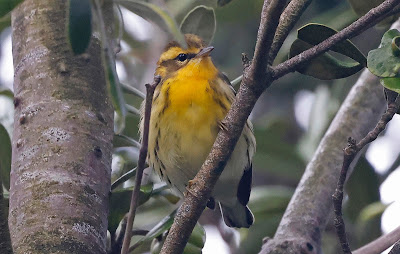There are many species on the British List that are beautiful birds in their own right. But some rarities attain near-mythical status because they have occurred before, several times, but have never been twitchable. Some are both. Up until earlier this year, Eleonora’s Falcon was one of these, and another was Blackburnian Warbler. These two also, oddly, share the distinction of being among a small number of eponymous species named after a woman – in the case of Blackburnian Warbler it is Anna Blackburne (1726–1793), a pioneering English naturalist who corresponded with Linnaeus and Pallas (among others) about describing and classifying new specimens from the New World.
Just three previous records of this most stunning of
American warblers had been seen by maybe 30 observers in total: one on Skomer
in 1961, identified after the fact from a painting done by one of only three
observers; one on Fair Isle in 1988 that was available only to those on the
island for a small part of one day; and a three-day bird on St Kilda in 2009
that no-one off that remote island knew about before its departure. The Fair
Isle bird was found by Bristol birder Jack Wilmott, who has rejoiced in the
nickname ‘Blackburnian Jack’ in local birding circles for over three decades. So,
a near-mythical, extraordinarily beautiful bird, speculated about by British
(and no doubt Irish) birders heading into every autumn for years, wondering
whether ‘this year’ will be the year it finally falls.
And so to 13 October 2022. Paul C was booked on a boat to
try to twitch a Tennessee Warbler seen the day before on Skokholm (he sat out
the Covid-ridden year of 2020, and so missed the unblocking of that also
near-mythical, but less striking, species on Shetland that autumn). No sign, so
the boat was cancelled and he headed back to Clevedon. Meanwhile, a 1st-for-Britain
moth, Southern Brindled Green, had been trapped overnight at Portland Obs, so
we made plans to go down to see that. Paul was just 10 minutes from picking me
up at my house when all hell broke loose – the pager screamed ‘Blackburnian
Warbler on Bryher’. The first real ‘drop everything’ bird on Scilly for some
years. I rapidly booked us flights on the best (indeed only) option available
that day, the last flight out to St Mary’s from Land’s End, grabbed my
overnight bag already packed and ready, and legged it out the door to jump in
Paul’s car.
We made good time and arrived at St Just airfield at 4.15pm
and checked in. Good news – the flight would be taking off earlier than
scheduled, by about 20 minutes. I had been trying to organise a taxi to the
quay, a boat to Bryher, and overnight accommodation on the way down – well, two
out of three ain’t bad, as the song says. Our taxi was waiting for us, and when
we arrived on the quay looking for a St Mary’s Association boat (Joe Pender had
been very helpful on the way down, but the earliest boat was likely to be 6pm,
heading out to pick up birders already there), we found a Tresco Boat Services
jet boat already there and just about to leave, with two spaces on it! The
logistics had worked out better than we could have possibly hoped – all it
needed now was for the bird to play ball.
It didn’t. We arrived on site in the Popplestone Fields
before 6pm, but the bird was last seen that evening at 5.40pm, despite the two
of us staying till dark – we’d missed it by about 10 minutes! And no way off
Bryher, even if we’d wanted to leave the island, and no accommodation available
either. So, after a wander through the fields in the dark and a pint at the
Fraggle Rock, we found the entrance hall to the island church and settled down
for a less than comfortable night. Good thing we were under cover – it pissed
it down for over 3 hours during the night.
We were out again early morning, on site at 7am and waiting
for birding light. At about 7.50 am I was in the right-hand of the two fields
it had favoured the previous day when I saw a small bird fly across from one
hedge to another, and called Paul over – it certainly had looked ‘interesting’.
About a minute later, Paul said ‘I’ve got it’. A quick view at first, but
conclusive – the Blackburnian had stuck overnight! Paul let out a huge roar of
delight and relief, then hurried to put the no doubt very welcome early news
out for the hundreds of birders on their way, while I got further views of the
bird.
Three boatloads of birders arrived after the Scillonian
docked, with many anxious faces I recognised disembarking and starting the yomp across to the
bird. The Blackburnian continued to show well, and on the journey back that evening the Scillonian was packed with very happy
birders indeed. We got a lift from Neil Alford back to St Just and a helpful
cleaner let us into the locked car park to start the journey home. We’d only
got to Penzance when Paul discovered he’d left his phone at St Just. Back we
went - it was all locked up again by then, but we managed to get it back. Then
home for just after midnight for me.
What a stunning, stunning bird!


Brilliant blogpost. Loved reading it Julian. I've added your blog to my Favourite Blogs list ! Cheers, Steve
ReplyDelete